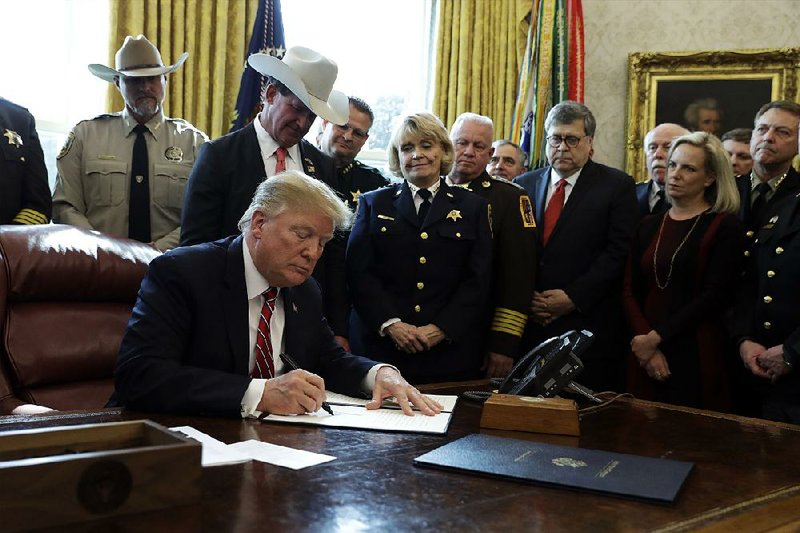WASHINGTON -- President Donald Trump issued the first veto of his presidency Friday to secure federal money for a border wall he promised as a candidate, capping a week of confrontation with both political parties.
"Today I am vetoing this resolution. Congress has the freedom to pass this resolution and I have the duty to veto it," Trump said.
The president was flanked by Vice President Mike Pence, Attorney General William Barr and Kirstjen Nielsen, the Homeland Security secretary. Barr said the president's emergency order was "clearly authorized under the law" and "solidly grounded in law."
The president's veto, which was expected, will send the legislation back to Congress, which most likely does not have enough votes for an override, meaning that Trump's declaration will remain in effect.
Twelve Republicans had joined Democrats to challenge Trump over his declaration of a national emergency at the U.S.-Mexico border, which would allow the president to circumvent Congress and spend billions on wall construction.
The president said Friday that he understood why some Republicans believed he had overreached. "They're doing what they have to do, and I put no pressure on anybody," Trump said. "I actually said, 'I could have gotten some of them to come along.' I said: 'I want for you to vote your heart. Do what you want to do. I'm not putting any pressure.'"
"I'll let them know when there's pressure, OK?" he added. "And I told them that. I said, 'When I need your vote, I'm going to let you know.' I didn't need the vote because we all knew it was going to be a veto, and they're not going to be able to override. It's going to go very quickly."
Ahead of his veto action, Trump praised those who voted against the resolution.
"I'd like to thank all of the Great Republican Senators who bravely voted for Strong Border Security and the WALL," Trump said on Twitter. "This will help stop Crime, Human Trafficking, and Drugs entering our Country. Watch, when you get back to your State, they will LOVE you more than ever before!"
Moments after the Senate voted 59-41 to disapprove his emergency declaration on Thursday, Trump gave his one-word response: "VETO!"
Most Republicans who voted for the resolution did so as a protest vote over the president's methods and their fear about the precedent of executive overreach rather than the underlying debate over whether a border wall is necessary. Democrats and some Republicans challenged the declaration as a blow to the separation of powers.
Trump had sought to frame the debate in terms of immigration, arguing that Republican senators who supported border security should back him on the emergency declaration.
Trump also has maintained he has the legal authority to act.
A Justice Department letter to congressional leaders details the arguments defending the emergency declaration, arguing that the president was authorized to do so by the National Emergencies Act of 1976.
"The president acted well within his discretion in declaring a national emergency concerning the southern border," the Justice Department argues in the letter.
The letter, which draws much of its reasoning from analysis done by the Justice Department's Office of Legal Counsel, points to various crises for which past presidents have declared emergencies under the law.
"Many such emergencies dealt with matters less threatening than the ongoing crisis on the southern border. For instance, prior national emergency declarations have authorized the use of statutory powers to prevent the importation of uncut diamonds ... and to promote democracy or conflict resolution in various countries around the world ... Presidents have exercised broad discretion in determining what challenges and situations amount to national emergencies."
The letter, sent last week to the top Democrat and Republican in the Senate, goes on to argue that the situation at the border has worsened.
"The situation at the border has deteriorated, moreover, because the population of migrants crossing the border has shifted from one that consisted primarily of single adults from Mexico, who often could be promptly repatriated, to one that includes large numbers of families and children from Central American countries -- people who cannot currently be detained in any significant numbers and who are generally more difficult to remove," the letter states. "That shift has placed a substantial strain on border-security resources. The President's emergency Proclamation reasonably described the current situation as an ongoing 'border security and humanitarian crisis'."
The emergency declaration still faces several legal challenges from Democratic state attorneys general and environmental groups that argue the emergency declaration was unconstitutional.
Those cases could prevent Trump from diverting extra money to barrier construction for months or longer. The American Civil Liberties Union, which filed one of the challenges, said the veto is meaningless, like the declaration in the first place.
"Congress has rejected the president's declaration, and now the courts will be the ultimate arbiter of its legality. We look forward to seeing him in court and to the shellacking that he will receive at the hands of an independent judiciary," said Executive Director Anthony Romero.
House Speaker Nancy Pelosi called Trump's veto a "lawless power grab" and railed that, even after both chambers tried to stop him, Trump "has chosen to continue to defy the Constitution, the Congress and the will of the American people."
Information for this article was contributed by Anne Gearan and Devlin Barrett of The Washington Post; by Michael Tackett of The New York Times; and by Jill Colvin, Zeke Miller, Alan Fram, Lisa Mascaro, Catherine Lucey and Colleen Long of The Associated Press.
A Section on 03/16/2019
